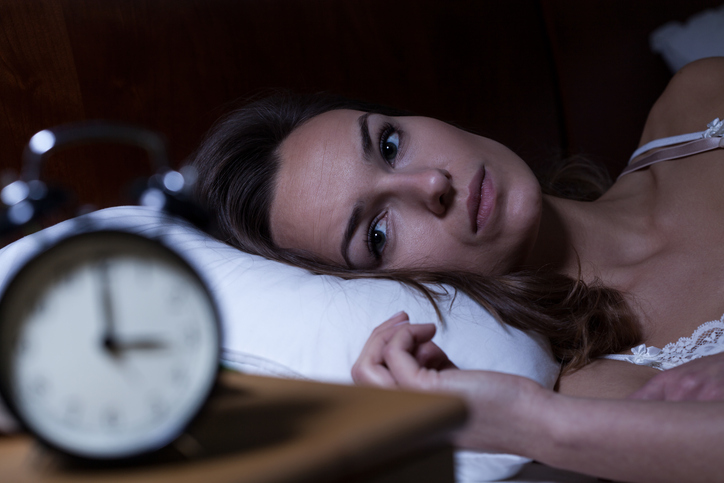10 Tips to Beat Insomnia
Menopause and a good night’s sleep may seem like a dream for many of us, but help is at hand.

If you are suffering from insomnia there are many steps you can take to change behaviours and lifestyle to help you get to sleep.
These are a good start in achieving just that.
1. Wake up at the same time each day
It is tempting to sleep late at the weekend, especially if you have had poor sleep during the week. However, it is bet to get up at the same time every day in order to train your body to wake at a consistent time.
2. Eliminate alcohol and stimulants like nicotine and caffeine
The effects of caffeine can last for several hours, perhaps up to 24 hours, so the chances of it affecting sleep are significant. It may not only cause difficulty initiating sleep, but may also cause frequent awakenings.
Alcohol may have a sedative effect for the first few hours after drinking, but it can then lead to a non-restful night’s sleep.
If you are on any medication that act as a stimulant, such as decongestants or asthma inhalers ask your doctor when they should best be taken to help minimise any effect on sleep.
3. Limit naps
While napping seems like a good way to catch up on missed sleep, it is not always the case. It is important to establish and maintain a regular sleep pattern and train yourself to associate sleep with cues like darkness and a consistent time for going to bed.
It is not the case for everyone, but for some regular naps can affect the quality of your sleep.
4. Exercise regularly
Regular exercise can improve sleep quality and duration. However, exercising immediately before you go to bed can have a stimulant effect on the body and should be avoided.
Try to finish any exercise at least three hours before you plan to retire for the night.
5. Limit activities in bed
If you suffer from insomnia don’t surf the net, watch tv, send emails or make phone calls. All these activities can increase alertness and make it difficult to fall asleep.
Your electronic devices in particular are a problem as they emit blue light and this suppresses the body’s release of melatonin a hormone that makes us feel drowsy. While this promotes wakefulness during the day, it becomes unhelpful at night when we are trying to sleep.
6. Do not eat or drink right before going to bed
Eating a late dinner or snacking before going to bed can activate your digestive system and keep you up. If you suffer from gastroesophageal reflux or heartburn, it is even more important to avoid eating and drinking right before bed since this can make your symptoms worse.
In addition, drinking a lot of fluids prior to bed can overwhelm the bladder, requiring frequent visits to the bathroom that disturb your sleep.
7. Make your sleeping environment comfortable
Temperature, lighting, and noise should be controlled to make the bedroom conducive to falling (and staying) asleep. Your bed should feel comfortable and at menopause the problem can often be hot flushes/night sweats so make sure your room is cool enough and you have natural fabric sleepwear and layers.
Try having a separate TOG duvet for you and your partner if you are not both happy at the same temperature.
8. Get all your worrying over with before you go to bed
If you find you lay in bed thinking about tomorrow, consider setting aside a period of time — perhaps after dinner — to review the day and to make plans for the next day.
The goal is to avoid doing these things while trying to fall asleep so it is also useful to make a list of tasks for the next day to try to eliminate one set of concerns.
9. Reduce stress
Is rarely recognised that stress will impact every single area of your life from your hormones to your sleep and so doing all you can to relieve that really will make a difference.
There are a number of relaxation therapies and stress reduction methods you may want to try from using essential oils or herb teas to having a relaxing lavender bath or listening to a meditation tape or practicing some deep breathing.
You might have to try several to see what works best for you, and everyone is different, so try and have a little toolkit of things that you know who work for you
10. Consider participating in cognitive therapy
Cognitive therapy helps some people with insomnia identify and correct inappropriate thoughts and beliefs that may contribute to insomnia.
It can also give you the right information about sleep norms, age-related sleep changes, and help set reasonable sleep goals, among other things.
Helpful information
It is no use, pretending that Menopause does not bring additional sleep issues because of the hormonal changes. Trying to sleep when you are having a hot flush or night, sweat, or having to get up more often as you need to pee more frequently are all going to disturb your sleep patterns.
Also stress and anxiety tend to increase at this time so if any of these is recommendations do help then you could also look at whether or not your diet is playing a part in preventing you getting to sleep, and this article will help you change that.
https://anna.blog.wellsprings-health.com/best-5-foods-to-aid-sleep/



















